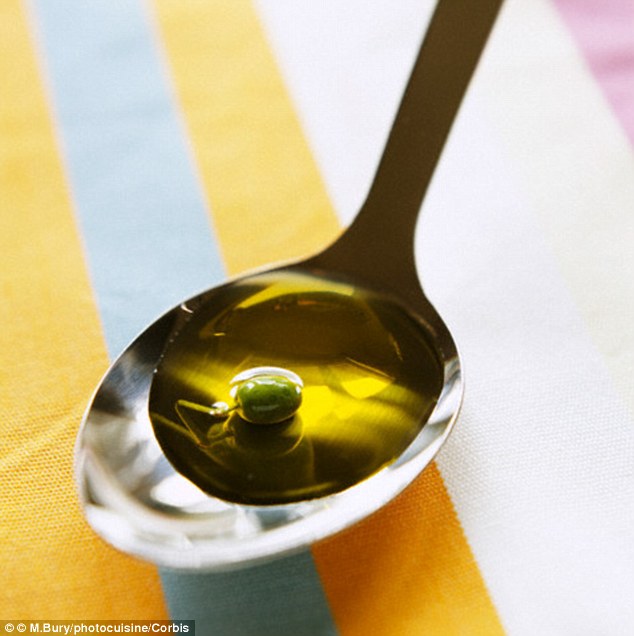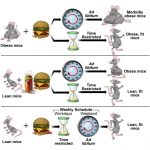Would YOU drink a GLASS of olive oil every day for a longer life?
- High olive oil intake linked with lower risk of heart disease and longer life
- Professor of Tim Spector, of King’s College London, tried an oil rich diet
- Drank a daily glass of olive oil for breakfast – which made him nauseous
- Decided to abandon the diet after it caused him to faint in the hairdressers
It was once demonised as fattening and carcinogenic.
Now, olive oil has been linked with a host of health benefits, including protecting the heart and lengthening life.
A recent study found the Mediterranean diet with lashings of extra virgin olive oil was even linked with a ‘relatively lower’ risk of breast cancer.
Writing for The Conversation, Professor of Tim Spector, of King’s College London, attempted to drink a glass of olive oil a day.
But while theoretically he recognised the health benefits of an oil-rich diet, in practice it was hard to stomach.
Here, he describes how a daily glass of the golden liquid left him feeling worse for wear…
I felt nauseous and dizzy. My attempted one week of following the intensive olive oil diet was not going well.
It was eight in the morning and on an empty stomach I had only finished half of the small glass of golden liquid specially chosen by my Spanish friends as the smoothest Albequina variety of extra virgin olive oil.
Dipping crusty warm bread into it before an evening meal is one thing. Drinking it neat in the morning was another.
For the sake of science and my book I was trying to emulate the diets of Cretan fishermen from the 1960s, who reportedly had a glass of olive oil for breakfast before a hard day of fishing or goat herding.
These high intakes of oil had been suggested as a cause of their remarkable longevity, despite the large amounts of saturated fat they consumed as a result.
I decided to replace my usual yoghurt and fruit breakfast with the golden drink to test the story.
Thirty minutes later I was lying on the floor after a faint in the hairdresser, which was unlikely to be a coincidence.
Despite realising I maybe should have lined my stomach first, I abandoned my heroic attempt.
In Britain and the US, people consume on average around 1 litre of olive oil per person per year, but isn’t much compared to the Greeks, Italians and Spanish who all consume more 13 litres per person.
Olive oil, with its high calories and mixed saturated and unsaturated fats, was once assumed by many doctors to be dreadfully unhealthy.
But health surveys of European populations kept finding that southern Europeans lived longer and had less heart disease despite higher fat intakes. It turns out olive oil was the likely reason.
Ten years ago an ambitious and unique research trial was started in Spain in 7,500 mildly overweight men and women in their 60s at risk of heart disease and diabetes.
They were randomly allocated to two diets for five years: one a low-fat diet recommended by doctors in most western countries and the other a high fat Mediterranean diet supplemented with either extra olive oil or nuts.
The ‘PREDIMED’ study, published in the New England Journal of Medicine in 2013 conclusively showed that the Mediterranean diet group had a third less heart disease, diabetes and stroke than the low-fat group. They also lost a little weight and had less memory loss.
The most recent results showed that it also reduced chances of breast cancer, albeit in a small number of women.
Picking through the data, the researchers found that the extra olive oil group did slightly better than the extra nut group, but both were clearly superior to low fat diets.
The research was also much more reliable than many diet studies because it was a randomised control trial that looked at a large group of people over a long period of time, rather than just monitoring people on one diet for a few days or weeks.
The benefits can’t be narrowed down to one single food or factor but to some general themes.
Extra fibre, a diverse range of fruits and vegetables, whole grains and legumes, yoghurts and cheese, small amounts of fish and meat, red wine, nuts and seeds and good quality olive oil all played their part.
However the authors believe that the olive oil itself was the most powerful single factor.
The cheaper forms of olive oil (those labelled regular or virgin) didn’t show any benefit – it had to be extra virgin.
The difference between the grades of oil lies not just in the lower acidity, freshness and richer taste but in the number of chemicals released called polyphenols.
High grade extra virgin oil, especially if cold extracted, has around 30 polyphenols that act as antioxidants, which reduce inflammation and also help reduce the effects of ageing particularly on the heart and brain.
Until recently it was thought these antioxidant polyphenols acted directly on genes and blood vessels.
But it turns out that they also work via our gut microbes that make up our microbiome.
This is the community of trillions of diverse bacteria which live in our large intestine.
They feed off the different polyphenols and produce other small chemicals (short chain fatty acids) that dampen down inflammation and help our immune system.
Complex high fat foods such as extra virgin olive oil, when eaten with a wide variety of other healthy polyphenol-dense foods, provide the basis for a rich and diverse community of gut microbes.
This diversity is increasingly being shown to be important for our health.
The original PREDIMED study didn’t measure gut microbes directly (although subsequent research is doing so) but the striking benefits of the Mediterranean diet and particularly extra virgin olive oil are that they are superb gut microbe fertilisers and improve gut health.
Critics of olive oil, who usually promote untested alternatives, suggest its lower burning temperature make make it more likely to produce potential carcinogens in cooking.
But the Spanish participants in the trial regularly cooked with the oil, reassuringly with no obvious health consequences.
Eating extra virgin olive oil as part of a diverse Mediterranean diet is clearly beneficial in Spanish adults.
And although genes partially control preferences, there is no reason to believe it won’t work in other cultures and populations.
If we start educating people to use high-quality extra virgin olive oil early in life and change its stigma as a medicine or punishment, we could make our populations and our gut microbiomes healthier.
Although we are unlikely to ever match the Greeks.






